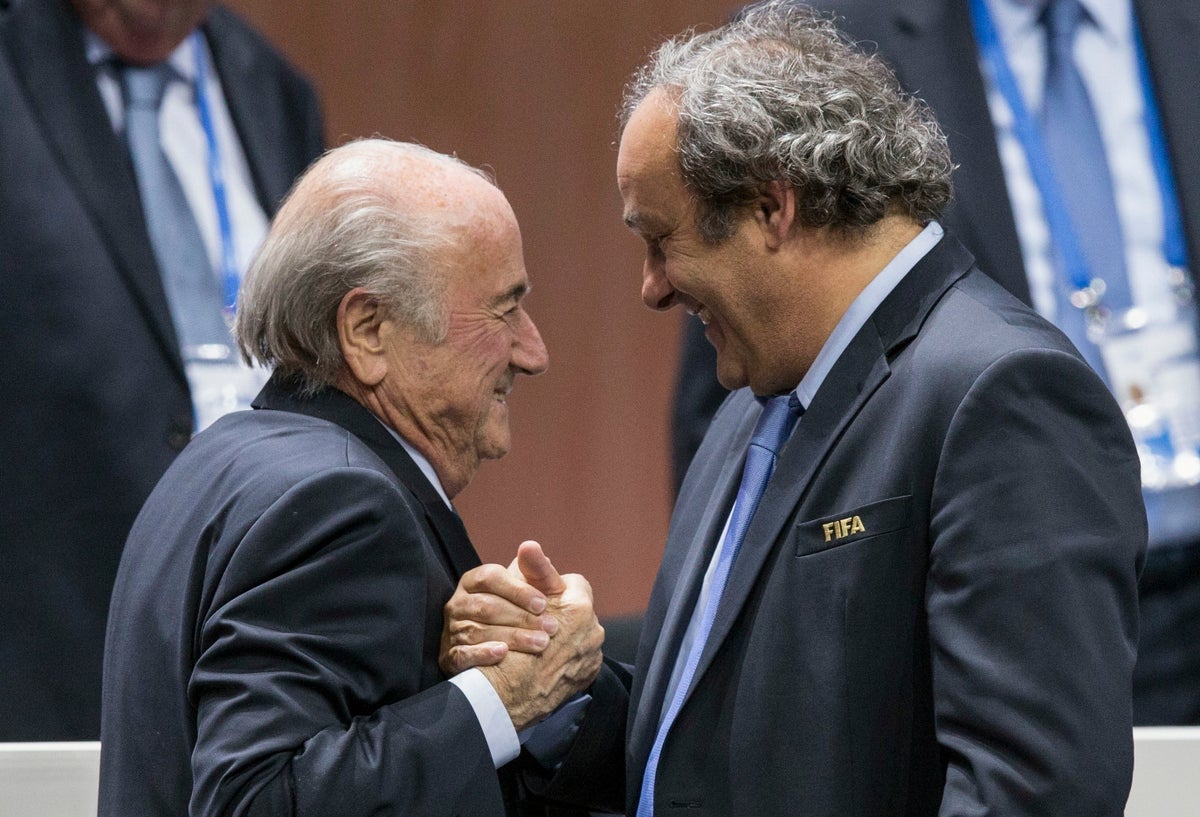
Sepp Blatter and Michel Platini’s 11-day trial on charges of defrauding FIFA starts Wednesday — finally bringing the epic downfall of soccer’s former world leaders into criminal court.
The fallout from the case ousted Blatter ahead of schedule as president of FIFA and ended Platini’s campaign to succeed his former mentor. It also removed Platini as president of UEFA, the governing body of European soccer.
In 2015, federal prosecutors in Switzerland revealed their investigation into a $2 million payment from FIFA to Platini from four years earlier. The pair will go on trial in Bellinzona.
The subsidiary charges include forgery of the invoice in 2011 that allowed Blatter to authorize FIFA to pay the 2 million Swiss francs (about $2 million) Platini had asked for. The claim was for the former France soccer great to be paid extra money for being an advisor — without having a contract for it — in Blatter’s first presidential term from 1998-2002.
Both have long denied wrongdoing and claim they had a verbal deal in 1998. That defense first failed with judges at the FIFA ethics committee, which banned them from soccer, and later in separate appeals at the Court of Arbitration for Sport.
Now the case comes to a criminal court which will sit only until lunchtime each day because of the 86-year-old Blatter’s health, 18 months after he was in a coma following heart surgery.
Blatter is due to be questioned Wednesday and Platini one day later. Both are expected to give closing statements on June 22, when the trial ends.
The three federal judges hearing the case are scheduled to deliver their verdict on July 8. Blatter and Platini each face of up to five years in prison, but suspended sentences are a likely option.
Blatter said in a statement everything was accounted for properly and he is optimistic about his chances at the trial. Platini denounced what he called “unfounded and unfair accusations.” He has claimed the allegations were fed to prosecutors in a plot to stop him from becoming FIFA president.
Arguments and evidence in court will revisit the widely discredited FIFA political culture during Blatter’s 17-year presidency, and around the time Qatar controversially won the hosting rights to this year's World Cup.
Platini sent his invoice to FIFA in January 2011, only weeks after the World Cup vote. It was quickly paid as Blatter’s next re-election campaign took shape.
Qatar’s top soccer official, Mohamed bin Hammam, used the momentum of his nation’s rising status in a failed challenge to Blatter. Platini was seen as both Blatter’s presumed heir, likely in 2015, and a key ally Bin Hammam needed to win European votes.
In the published indictment, Swiss prosecutors do not cite FIFA politics as a motive for payment. They focus on the facts of Platini being enriched by an allegedly unlawful salary claim and a further 229,000 Swiss francs ($238,000) of social security taxes paid by FIFA in Zurich.
The Platini money was “accounted for accordingly and approved by all responsible FIFA authorities,” Blatter said in a statement. That view is disputed by a former employee, however.
The additional money was never accrued as it should have been in FIFA accounts from 1999, according to then-FIFA accountant Jeannine Erni, who was interviewed for different investigations. She said the payment was “odd” and looked related to the 2011 presidential election.
Another former staffer, then-FIFA head of compliance Ivo Bischofsberger, said in questioning cited by CAS that he “always had doubts about the whole story. Did it smell? Yes.”
Platini’s contract with FIFA, signed in August 1999, was for 300,000 Swiss francs ($312,000) annually. Platini said he asked for “1 million” but Blatter would pay only the same as FIFA’s then-secretary general and promised the balance later.
Platini’s contract expired in 2002, when he was elected to the FIFA executive committee. A letter to him, signed by Blatter in September 2002 and seen by The Associated Press, said their agreement was settled and terminated.
Platini testified at CAS he first asked for extra money early in 2010 after FIFA paid a seven-figure severance to Jerome Champagne, a French former diplomat who was ousted as a Blatter aide. The invoice eventually requested 500,000 Swiss francs ($520,000) extra for each year of advisory work.
Witnesses due in court include two former elected FIFA and UEFA officials, Ángel María Villar of Spain and Antonio Mattarese of Italy, and former federal prosecutor Olivier Thormann, who was cleared in 2018 of misconduct in the FIFA investigation.
Thormann will be questioned Thursday as Platini’s lawyers try to show the prosecution office colluded with soccer officials, and helped Gianni Infantino become FIFA president in 2016.
Attempts to summon Infantino to be questioned in court have failed. Platini has also filed a criminal complaint in France against Infantino, his former general secretary at UEFA.
Platini and Blatter have both questioned how prosecutors learned about the disputed payment.
Swiss prosecutors began investigating FIFA in November 2014 when the soccer body filed a criminal complaint about suspected money laundering in bid contests to host the 2018 and 2022 World Cups. Russia and Qatar won those votes by the FIFA executive committee in December 2010.
Swiss authorities seized documents and data at FIFA headquarters on May 27, 2015 — the day soccer officials were arrested in Zurich hotels in a separate, sprawling American investigation of corruption.
Three weeks later, then-attorney general Michael Lauber said 53 suspect transactions possibly linked to World Cup bidding had been alerted by banks in Switzerland.
More than 11 years after Platini was paid, FIFA is trying to recover the money.
“FIFA has brought a civil action against both Blatter and Platini to have the money which was illegally misappropriated repaid to FIFA,” the soccer body's lawyer, Catherine Hohl-Chirazi, said in a statement, “so it can be used for the sole purpose for which it was originally intended — football.”







